6. Hospitality on the Attack
Right up until the end, as you were making The Legend of Zelda: Ocarina of Time, you were putting your ideas together, saying, “Let’s put that in!” and “And that, too!” and “We can fix this!” When it finally went on sale, it touched the hearts of people all over the world. Why do you think that is?
A lot of people say they like the epic story. But on the level of the script, the story isn’t actually that epic.
There aren’t a ton of lines of dialogue like in an RPG.
Right. I think the reason the players sense an epic story and drama is that everything you experience within the game is added to the story.
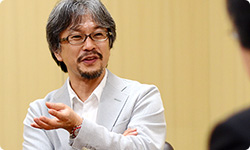
Your memories of solving a puzzle and thinking, “I’m so smart,” pile up as such experiences.
Right.
And that makes it epic.
I felt that way, too. In making The Legend of Zelda: Ocarina of Time 3D for Nintendo 3DS, I played the original Nintendo 64 version again for the first time in a long while and sensed an immense amount of hospitality.
Hospitality?
In the dungeons, for example, I felt as if someone were saying, “Welcome!” each time I entered a room. And when players go into a room, there’s a roughness in the way it attacks with its full strength. After 13 years, it still has that impact.
Um, the words “hospitality” and “attack” don’t usually come up together.
Hmm. I suppose not. (laughs)
I mean, what kind of hospitality is hospitality that attacks? (laughs)
Well, when I say hospitality, I don’t mean waiting on you hand and foot, I mean that when you go somewhere, all kinds of play await for your enjoyment.
Oh, that is true. Wherever you go, there’s a new experience.
That concentration is amazing. And it isn’t a highly organised kind of hospitality like today’s games exhibit. Ocarina of Time has a certain bumpiness, irregularity or roughness.
And that’s what you mean by attack? (laughs)
Yes...right. (laughs) Many players who grappled head-on with its imperfectly organised hospitality at the time still talk about it.
Actually, a lot of places turn away the player.
That’s roughness, too.
It isn’t perfectly organised, so sometimes you end up wandering aimlessly.
Yes. There are a few places where you get lost.
Like in the Water Temple.
Man, don’t go into that! (laughs)
(laughs)
But the people who get lost there can refresh at the Fishing Pond.
Oh, I see. So that’s how you set it up! (laughs)
Oh right, of course. (firmly)
They are right next to each other...
It’s the perfect placement.
Miyanaga-san, did you hear that? (laughs)
Yes. Thank you very much. (laughs)
Last, I’d like each of you to say a few words about how you would like people to play Ocarina of Time now that it has returned 13 years after its original release. We’ll start with you, Haruhana-san.
When I first heard about the remake, I was really happy because people who hadn’t experienced the Nintendo 64 version would have a chance to play the game. But I was also worried that since we were faithfully remaking the original, people might think it was old.
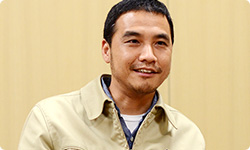
After all, it is 13 years old.
But when I played the Nintendo 3DS version, I realised that it hadn’t faded. There are new elements this time, including the stereoscopic 3D, so I hope people who played it before will play it again without saying, “Why now?” I also hope people who haven’t experienced Ocarina of Time before will experience its “rough hospitality.” I’m also looking forward to hearing what people think of it.
I was involved with the remake, too. With regard to game operation, people who played the Nintendo 64 version say it was really comfortable and idealise it.
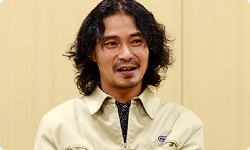
It is a good memory to them.
Yes. So I thought the work this time involved turning minuses to zeroes.
What do you mean?
With regard to the things everyone has idealised, we gave high priority to raising everything to the same level.
If players think, “It wasn’t like this,” that’s a minus, so you have to make them think, “Yes, yes. That’s how it was.”
Right. It was rewarding, though, to see how what we had made surpassed the Nintendo 64 version. Neither people who experienced the Nintendo 64 version nor new players will think of it as an old game. I think they will be able to play it as a new game, so I hope they enjoy it.
I hardly touched development of the Nintendo 3DS version at all. I was uneasy before I played it. But when I did, the next thing I knew, I was totally immersed in it.
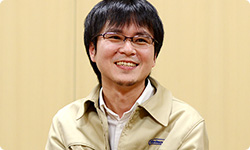
What did you think when you saw Hyrule Field - which you had designed - in 3D?
The hills looked like hills!
I see. (laughs)
On the Nintendo 64 version, they didn’t feel much like hills. But in 3D imaging, you can really tell how the hills rise up. I thought, “Oh, so this is what the landforms were like!”
Even though you made the original landforms (laughs), you rediscovered them!
Yes. It’s more realistic. And you can really feel that special atmosphere that The Legend of Zelda: Ocarina of Time has - which was very important. So I hope people who play it for the first time and people who played it before will both experience a world slightly different from that of the Nintendo 64 version.
To put it a different way, suppose a ramen shop I used to love closed 13 years ago.
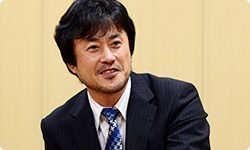
Ok. (laughs)
And all this time I’ve been thinking, “Man, I would love to eat that ramen again!” Then that shop opens again! The Legend of Zelda: Ocarina of Time 3D is like that.
And when you go in that shop, you think, “Oh, this is the taste!”
No, “It tastes even better!” (laughs)
(laughs)
Rather than just look back fondly, I want everyone to experience the best possible taste that is only possible now, 13 years later.
It recreates that familiar taste, but as a new game.
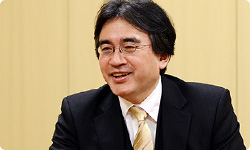
However, having something I made 13 years ago reappear is a little embarrassing, like looking at essays I wrote at school. (laughs)
In the last “Iwata Asks,” Koizumi-san said he was scared to play it. (laughs) Next time, I will be talking to people who, 13 years after the original game, breathed new life into The Legend of Zelda: Ocarina of Time. Thank you for your time today.
Thank you.